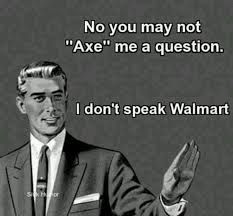WarrantMan said:
I recently conducted a non-scientific double blind study on this phenomenon and had some interesting observations as a result. To wit, I "asked" some people to pronounce the word "ask" written on a piece of paper. Unsurprisingly so, some questioned responded "axe." Others responded in the true English pronunciation "ask."
I then queried both groups as to the name of the protective facegear they were forced to wear, and all persons responded in correct English pronunciation "mask." Not a single person said "max." This revelation was confounding...
An interesting observation, which I quickly reviewed because in my native language we have similar issues with some sounds, for instance proper language consonant sequence
sp becomes
ps in some local dialects (imagine English
wasp becoming
waps).
The ask/ax-dilemma, however, seems to be of a different nature. Both ask and ax are correct and represent co-evolved forms of the same verb. Some basic introduction in
Smithsonian Magazine, something more in
NPR, and an overview in
wiktionary. Mask/max is dissimilar: they truly represent different words..
Therefore, I would not use the term "true English", since from my POV both forms are "true English". According to my High School teacher, "true English" is BBC English. Just image you guys getting F after F

I'm on an ironic drive here, no offence intended. Just think about it, what is "true English"?
I'm looking at this through the glasses of my own native language, Dutch, which actually is a compound name of sorts. It harbours several large dialects, which are not treated as disrespectfully today as they were before. About 30 years ago, the unified Dutch language was called "General Civilized Dutch", and language rules were dictated by some learned A-h0les in Amsterdam, effectively putting aside the rich local language traditions and imposing what they considered correct. This situation has evolved, luckily. A proper term to describe "proper language", again IMO, is "Standard Dutch", or "Standard English".
Just ponder on "true English" for a bit... Who has decided for you what is correct? Your parents? Teacher? A committee of Washington DC bureaucrats? The Queen?
When I arrived at school, I was basically told that whatever my parents (and consequently their parents, grandparents, etc.) had learned me was "incorrect".
My better half received the rules of "correct Spanish" she is obliged to apply at her job, but these rules strongly deviate from the Real Academia Española's recommendations. The reason for that is simple: some politically motivated bureaucrats in Mexico City have enforced it. Just think of the consequences this has on the next generation, who might remain unaware of this...
I think WarrantMan already knows why English is important...

https://www.youtube.com/watch?v=LuxJAfjbb_M





